
As India rejoices over the impressive victories achieved at the 2024 Cannes Film Festival, celebrated actresses Tillotama Shome and Huma Qureshi illuminated the harsh realities facing independent filmmakers in the country. Payal Kapadia’s film “All We Imagine as Light,” which clinched the Grand Prix, and Anasuya Sengupta’s groundbreaking win as the Best Actress in the Un Certain Regard section, have marked monumental achievements. However, behind these triumphs lies a narrative filled with obstacles and perseverance.
Huma Qureshi, a distinguished actress, expressed commendation and concern on social media. She highlighted the discrepancy between the financial indulgence lavished on individuals unrelated to cinema by major brands and companies and the dire need for supporting independent filmmakers. In an Instagram story celebrating the Grand Prix honor received by the “All We Imagine as Light” team, comprising Payal Kapadia, Kantari Kanmani, Divya Prabha, and Chhaya Kadam, Huma wrote, “So proud of you all […] Hope. There is hope,” capturing both her pride and aspiration for more inclusive support in the future.
Qureshi followed up with a reflective post, emphasizing the necessity for structural support. “Cannes Film Festival is a film festival where Art is celebrated for Art’s sake… I really hope some of these brands/companies that spend hundreds of dollars sending people who have nothing to do with films instead now find a way to support small and independent films,” she wrote. She also expressed admiration for the homegrown filmmakers, stating, “I really am so proud of all the incredible women who have brought home such glory! More power to them and to our homegrown storytellers.”
Similarly, Tillotama Shome shed light on the adversities these independent filmmakers face, revealing that many had to scrape together their resources to attend the prestigious festival. Shome underscored how these filmmakers not only battle financial constraints but also lack institutional and emotional support from their homeland.
. Her revelations were both poignant and unsettling, revealing the true grit behind these celebrated accomplishments.
Shome’s Instagram post was a heartfelt tribute to the women from India who shone at Cannes. “I wanted to put some flowers out today, to celebrate the women from my country at Cannes. How did they get there? Ask them and you will weep,” she began. She poignantly described the challenging journey of an Indian indie film making it big without any institutional backing: “It is nothing short of a miracle for an Indian indie film with no institutional, financial or emotional support from the country, to make it this big.” She raised critical questions about the funding struggles and the extreme efforts required to present their work on an international stage, noting that even attending Cannes necessitated self-financing by the actors.
The actress powerfully stated, “How were the films funded, how difficult was it [to] complete the film in that budget, oh and how did the actors put together the money to fly to Cannes, so they could bring home the prize, that we are so proud of? Let’s put some skin into this game if we are feeling so proud. Otherwise, it’s not pride, just shame for not believing in your own storytellers, until the world asks you to look at them. These women are filling the cracks and saving the building.”
Her remarks conveyed not just an acknowledgment of the talent and spirit of these filmmakers but also a call to action for the broader industry and society to invest in and believe in their own artists proactively. Shome’s and Qureshi’s sentiments represent a pressing call for systemic changes to sustain and nurture the true essence of independent filmmaking in India.
Both actresses echoed a shared sentiment of pride mixed with a plea for better support infrastructures for independent films. They argue that substantial resources should back these dedicated storytellers from the start, rather than only after international recognition. The Cannes Film Festival, an apex celebration of cinematic artistry, became not merely a platform for recognition but also a rallying point for addressing these persistent disparities.
In conclusion, while the victories of “All We Imagine as Light” and Anasuya Sengupta’s milestone performance are monumental, they are underpinned by stories of resilience and formidable odds. Huma Qureshi and Tillotama Shome’s voices elucidate an urgent need to reexamine and bridge the support gap for independent filmmakers in India. This transformative dialogue promises hope and a more inclusive future for the realm of Indian cinema.












